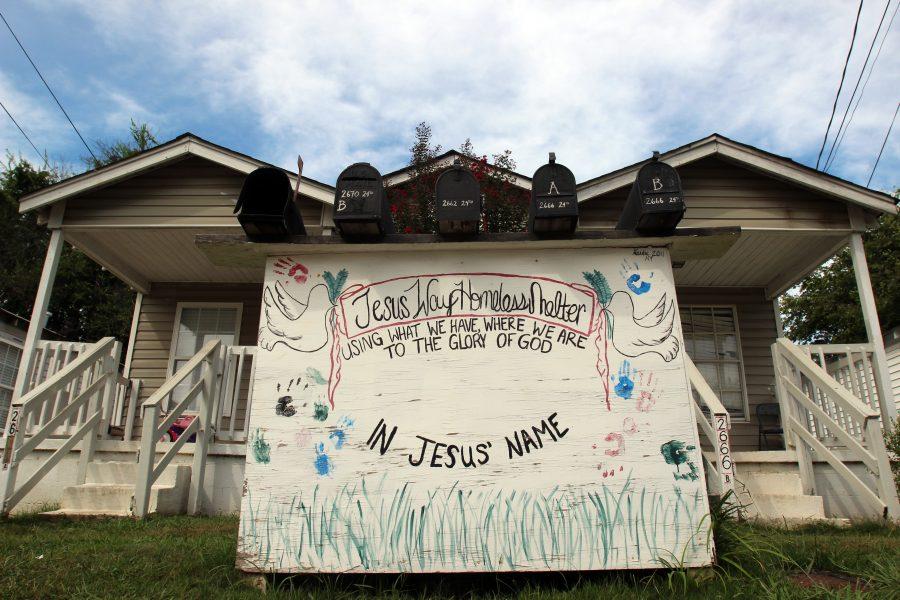By Lauren Lane | Staff Reporter
“This is just not a good homeless town,” said Pastor Larry Doughty, founder of Jesus Way Homeless Shelter. “By this I mean that there are not a lot of opportunities here for the homeless to be taken care of or to come out of their homelessness. There’s no good reason for them to be here, but they are, so that’s why we exist.”
Doughty and his staff receive 15 to 20 calls daily about different homeless people in the area looking for some stability. The first thing he asks them is where they came from and where they want to be. He said that those who don’t reply to either question with Tuscaloosa are given the option to have a bus ticket to a bigger city that will provide them with more opportunities to get back on their feet. But, he said, a majority of these people have lived in Tuscaloosa all their lives and can’t imagine being anywhere else, even if there is not much offered to them here.
“I’ve been a resident of the west side all my life,” said Regina, a woman taking shelter at Jesus Way for the past week. “I know a lot of people that went to Birmingham and got shelter, got their own place quicker and had more offered to them than could ever be found in Tuscaloosa. But this place is my home, even if I don’t really have one.”
Regina struggled for years to keep a job due to fibromyalgia and severe back problems, leaving her homeless since 2013. After Tuscaloosa’s largest homeless shelter was destroyed in the devastating tornado in April 2011, there are few places for the homeless to find refuge.
“There seems to be a bigger issue than there are just a lot of homeless people,” said Tricia Perkins, communications and events director at Calvary Baptist Church. “A lot of people you see here in your day-to-day lives are just one paycheck away from being homeless. One thing we have learned from [working with the homeless] is that there are a lot of people trying really hard but falling short still.”
Regina understands the stigma associated with being homeless–that many choose to be because they don’t want to take care of themselves. She said some people have no choice and don’t have many options to get out.
“I’m most concerned with being able to take care of my granddaughter,” Regina said. “She’s four and has been having seizures since she was a baby. I’m so desperate to get my own place so that I can take the best care of her. I just can’t do it on my own.”
Regina and several of the other women living in the compound struggled to receive any support from the community before arriving at Jesus Way.
“It seems like it’s a circle of agencies that you keep coming back to,” Ebony, another resident of Jesus Way said. “Someone will tell you to call Temporary Emergency Services, and they tell you to call Turning Point or somewhere like that, and then they tell you to call the place that referred them to you first. If there [are] only four or five agencies doing the same thing, especially with so much need here, they can’t help everyone. It gets frustrating. People can’t get their basic needs met.”
Ebony works at the University during football games, alongside several other part-time jobs in order to save up for a house for her and her three daughters.
“I think, if anything, a lot of the properties in the area are being bought by [the University] and rented out to students,” she said. “Now that’s a great thing, but I also understand that there are a lot of families here looking for the same low prices and better locations than where they are now, but those prices and locations are only for students. Tuscaloosa has become so developed since the tornado, but only for certain people and in certain areas.”
Ebony and her youngest daughter are the longest-residing people at Jesus Way, and she said that being there has done wonders for her both physically and emotionally.
“Being homeless doesn’t just put you in a rough physical state; it’s just as rough emotionally,” she said. “Just being here three or four days gives a whole new outlook for a person. There’s some hope again.”
Doughty is excited for the community to have The Salvation Army shelter rebuilt by the end of the year so more people can find refuge, but Ebony hopes to stay at Jesus Way until she finds a permanent residence. She likes that the shelter has been set up like a village, where each family has their own cottage to stay in for as long as they need so that she and her daughter don’t have to constantly be reminded of their homelessness like they would in a typical shelter.









